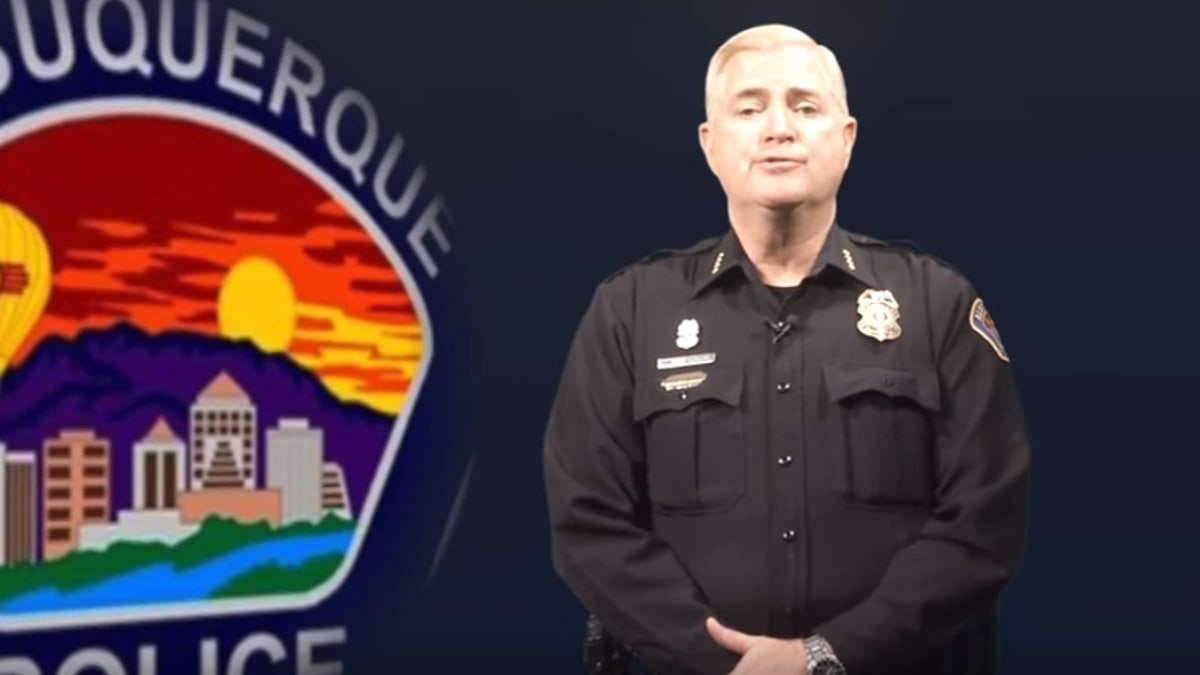
ALBUQUERQUE, N.M. – This is a city where violence and property crime is spiraling out of control. That’s why police officers here were bewildered when they received an order from their police chief that they could no longer make arrests on non-violent misdemeanor crimes.
On Tuesday, in both a memo and video, Albuquerque Police Chief Gorden Eden issued an order directing officers to issue citation rather than make arrestes on low-level crimes to comply with a settlement agreement on a class-action lawsuit.
The suit, which was filed in 1995, stemmed from an incident where a man was arrested for a misdemeanor at a time when the local jail was severely overcrowded.
DOJ INVESTIGATING ALLEGATIONS ON ALBUQUERQUE POLICE VIDEOS
“As part of the city’s settlement, a new special order has been issued for all APD officers," Eden said in the video. “Effective immediately, all officers shall issue citations when appropriate in lieu of arrest on non-violent misdemeanor offenses.”
But, in a twist, Assistant Police Chief Robert Huntsman said policing will be business as usual.
“This order in no way restricts officers’ discretion to make arrests when necessary to protect the public. Citations have always been an available option for certain non-violent misdemeanor offenses,” said Huntsman. “This special order and video remind officers to issue citations ‘when appropriate’ and ‘when there are no circumstances necessitating an arrest.’”
Celina Espinoza, a department spokeswoman, said the message is clear: Officers have the discretion whether to cite and arrest.
But the two statements left officers feeling confused.
Shaun Willoughby, president of the Albuquerque police union, said he learned of the memo on Tuesday from enraged rank-and-file officers who called the mandate demoralizing for an already understaffed department that is under a microscope from the Department of Justice.
NEW MEXICO DRUG CARTEL BUST SHOWS LAW ENFORCEMENT FEELS MORE EMPOWERED
“We’ve always had the discretion placed in our hands for decades as to whether to cite or arrest an individual, now it’s mandated,” said Willoughby, a 14-year veteran of the department who is an active-duty detective.
Willoughby said there is no ambiguity with the mandate, which he said will have grave consequences on public safety and quality of life for Albuquerque residents.
“The fear of apprehension and jail to a criminal is real,” he said. “Now that has been eliminated.”
In Eden’s memo, officers were given a list of 22 offenses that would no longer require an arrest. Among the most glaring is larceny under $500, criminal damage to property under $1,000, shoplifting under $500, prostitution and criminal trespassing. Officers were also given a pocket card as a reminder on the field.
The field cards bear the name of Jimmie McClendon, a homeless man with mental issues who filed the initial lawsuit against the city because of overcrowding conditions at the Metropolitan Detention Center. The jail that spawned the lawsuit is now closed and McClendon died more than 15 years ago.
The goal of the new directive, Espinoza said, is to stress to police officers in the department that making arrests for low-level is not always the best and only option. This sentiment is echoed by some in criminology.
“Chief Eden shows that a department cannot arrest its way out of its community’s crime problems, and that it leads to the disproportionate targeting of ethnic minority subjects,” said Mike Tapia, an assistant professor of criminal justice at New Mexico State University. “It is a proactive practice that increases the quality of relations between police and the public which, in turn, increases crime-solving ability.”
Willoughby disagrees. He said the police officers no longer have discretion when making low-level arrests. Plus, he said, the officers are expected to drive the suspects to a bonding window where they could pay fines to avoid jail time.
“We’ve always done this if we had a cooperative suspect,” Willoughby said, “But now we are to bring everyone who is eligible and what are we supposed to do with them if the window is closed?”
ALBUQUERQUE COPS' MISTRIAL FUELS ANTI-POLICE SENTIMENT
Ironically, the Bernalillo County Sheriff’s Office, which is in the same jurisdiction, will continue to make misdemeanor arrests, when appropriate.
“Nothing has changed for BCSO when it comes to misdemeanor arrests,” said sheriff’s office spokeswoman Felicia Romero. “Deputies may use discretion in those cases (misdemeanors) to issue a summons or make an arrest.”
Willoughby said the new directive is contrary to the “broken windows” theory made popular by New York City Mayor Rudolph Giuliani and Police Commissioner Bill Bratton in 1990s. That theory finds that if minor infractions are ignored, they could snowball into more serious crimes.
Crime plummeted in New York City when this duo implemented this practice.
Albuquerque has one of the highest burglary and auto theft rates in the country.
“This mandate will empower the criminal element,” Willoughby said. “We’ll now have suspects tell us we can’t arrest them.”

